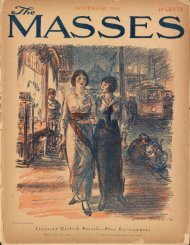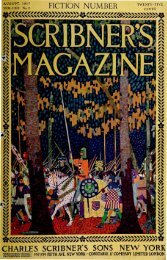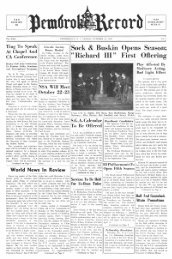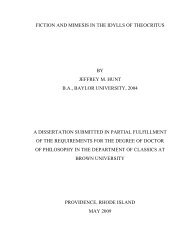View PDF - Brown University Library
View PDF - Brown University Library
View PDF - Brown University Library
- No tags were found...
Create successful ePaper yourself
Turn your PDF publications into a flip-book with our unique Google optimized e-Paper software.
100 Government Ownership and Individual Enterprisecost accounting, a business man on whomthe sternest problems of our ship constructionhave fallen from the start, butone who yet felt assured that the UnitedStates could build and operate its shipssuccessfully and continuously, expressed,in an interview, his concern at the failureof our national labor policies during thewar, and of course the failure of a laborplan is always an indictment of a wholeorganization. "There should be priorityboards as to labor," he said, "as theyare what every construction programmeshould start with. There are such boards,but they are headed up nowhere . . . ourexperience makes me reluctant to believein the existing method of determiningwages in any manner except in terms ofproduction. When an employer sitsdown to work out production costs hethinks in terms of production, but ournational boards determine wages on thebasis of cost of living, which results in uncertainfactors, a dangerous circle, andconfusion and waste."Considering the apparent failure ofgovernment operation, evidenced notably,at last, by the selling of the ships toprivate interests and the assertions madeby Mr. Schwab five months before, I recentlysought out Mr. Schwab again, toascertain, if I could, why, in his mind, theapprehensions he entertained seemed inlarge part already demonstrated."It is unfortunate," he said, "that thetest of government operation had to bemade in time of war."During the war we were all encouragedto the greatest possible effort by thealmost universal approval and encouragementof all Americans, under which circumstancesevery man must do his best.There could have been no mainspringstronger than the patriotic wish in all toserve the country that we love. To thatcircumstance I attribute all such successas we achieved during the war."Now, one of the things I feared whenthe great corporations came into existencewas the loss of individual initiativeand enterprise. In my own earlier years,when I was younger and full of moreenergy and enthusiasm, I was associatedwith Mr. Carnegie, one of the greatest ofall industrial leaders. He created a bondof interest between himself and his menwhich resulted in a large success. Whilehe owned practically all his works, hegave to his younger managers practicallyhalf of his income, and with such stimulusand such inspiration the results were sureto be successful, as indeed they were. AtBethlehem, without even believing thatthere was any chance of my taking Mr.Carnegie's place in the industrial world, Idid, with reference to my relations withthe managers in my works, as Mr. Carnegiehas done. It was on that account thatI developed a profit-sharing scheme bywhich every one in our business was concernedin its success, with the result that,as you know, our managers and men earnunprecedented rewards."It is my thought that the best effortfrom men is obtained by such personalapproval and encouragement, which ourgovernment, for reasons which we can allapprehend, could not entertain."In business it is essential, I am sure,personally to inspire every one about you.I do not think direct government controlcan ever be successful, because with governmentoperation in a democracy that isimpossible. For there is much more inbusiness than simple direction. A businessmust have soul, spirit, and enthusiasm,or it will fail."What is true of a business or a greatcorporation is to a greater extent true ofgovernment enterprises, because you cannever get the government to profit-shareor to pay for the best results by the ablestmen; and I contend, to go no further, tothat extent at least it will fail to achievein industry the results that have beenachieved by the men whose pictures yousee on the walls of my office—Mr. Carnegie,for instance, James J. Hill, E. H.Harriman, George Westinghouse, SenatorClark, and all those others."Such men had not the financial advantagesfor large enterprises that, ofcourse, the government has, but, on theother hand, one of the things that menwho do best in business learn they learnfrom the cruel necessities of private capital."Such men learn by experience thatcapital must be used with wisdom andcare. They learn that any enduring businessmust be founded on the best economicprinciples, and they know- from










